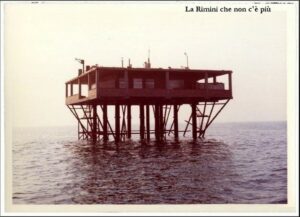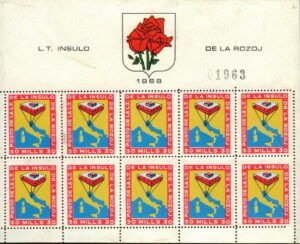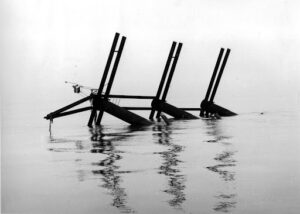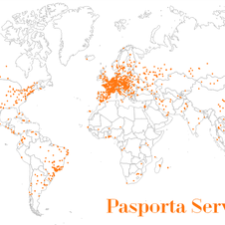Today it is Esperanto Day. For that occasion, we investigate truth and reality of one of the states that had Esperanto as a national language. Now a major film.
In 1968, the world was in uproar. Demonstrations by young people against the establishment in major cities in Europe, North and South America. That year, an Italian engineer in his 40s, has succeed in building an island, somewhat like a drilling platform, outside of the territorial waters of Italy. Giorgio Rosa was his name. His micronation, covering 400 square meters, had a bar, a post office, a restaurant. Tourists arrived by boat, mainly from the harbor of Rimini in Italy, a 20-minute sailing tour. The builders of the island declared independence, and Rosa was elected, or self-elected, as the president of this new state. Another prominent citizen was the German-born Rudy Neumann, a stateless man after he had deserted from the German national-socialist army when stationed in Italy. As they were internationalists, not connected to any existing state, they chose Esperanto as their national language for Rose Island. The island got its Esperanto name, which was also used on their post stamps. I doubt, however, whether Esperanto was used a lot on the island in dialogues. It became a tourist magnet, and the dance parties and bars attracted many visitors. Newspapers all over the world reported about it. The Italian authorities did not like the existance of the island, as they saw it as a trick for tax evasion.

When the Italian filmmaker Sydney Sibilia heard about the island, he immediately thought it would be a fantastic topic for a feature film. He visited Giorgio Rosa for permission, and the engineer, at that time in his 90s, was enthusiastic about the idea. Unfortunately, the ex-president of this micronation did not live to see the result. The film was released in 2020 by Netflix. Lingoblog watched it.
The island of the Rose: film and reality
The film is worth seeing. You meet the somewhat crazy engineer who had built his own car as an exam project. He was distracted enough, however, to forget to have license plates. There are other people as well. His school friend, the corrupt son of a local industrial, who helped him providing building materials. Then there is the German-Italian-stateless dance club owner Rudy. The engineer’s love of his life, Gabriela. A somewhat disturbed castaway on his sailboat looking for shelter from the storm. And their struggle for independence, and their attempts to be recognized by the United Nations and the European Union. They may have almost succeeded. Unfortunately, before this happened, the Italian army invaded the enemy nation, and this military action ended their social experiment. No casualties were made in this act of international aggression, except for the engineer’s dog, who did not survive the attack. All in all, the independent state and dance club only existed for less than two months.

I have not investigated in depth what is true and what is fantasy in the film. The love story? Partly. Did he really build his island (partly) to show his love for Gabriela? I doubt it. Was the idea that Esperanto should be the national language a spontaneous idea? Perhaps. Did they really get hundreds if not thousands of letters from people who wanted to become citizens of the island and give up their national passports? Maybe. One thing that is certainly not true is that the government of the island witnessed the destruction by the Italian army. The island was destroyed months after the forced desertion.

The film was made for Netflix, and can only be seen there.

Lots of information is available on the island state on the internet.
Peter Bakker was once chosen to become a part-time professor in interlinguistics sponsored by the Dutch Esperanto Union. Instead, he opted for a full-time position as a lecturer in linguistics at Aarhus University. For unknown reasons, he never became a full professor at this university. His grandfather was an Esperantist.







